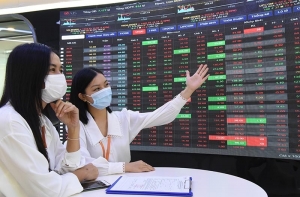INTERNATIONAL INVESTMENT
AND PORTAL
As Vietnam’s stock market has witnessed a sharp plunge for over a month now, the tickers of many securities firms have lost 30-40 per cent, even 60-80 per cent, compared to their peak.
According to Agribank Securities JSC (Agriseco), the tickers of securities firms are susceptible to a high level of fluctuation and closely attached to stock market performance.
That is because stock market movements directly affect securities firms’ business operation in a specific period.
As the stock market took a deep plunge in both liquidity and score in the past month, the price of this ticker group took a nosedive.
 With the stock market rally, the tickers of securities firms might come back stronger compared to those of other sectors
With the stock market rally, the tickers of securities firms might come back stronger compared to those of other sectors
In the short term, Agriseco assumed that selling force at this ticker group remains big and shows no sign of halting.
However, when the market begins to rally, this ticker group would bounce back stronger compared to other ticker groups.
Negative movements of the stock market in the past month have badly impacted securities firms’ business operations.
For instance, their revenue from brokerage services might undergo a sharp decline due to sharply dwindling market in both liquidity and score.
As general market situation is forecast to continue submerged in hardships in the forthcoming time, it would be hard for securities firms to improve their profit prospects.
The transaction value in the third quarter just averaged $695.6 million per session, losing 40 per cent compared to one year ago.
The firms’ accrued profit has also decreased due to increasingly stiff competition, meanwhile transaction fees tend to go down.
Bui Van Huy, director at Ho Chi Minh City branch office of Hanoi-based DSC Securities Corporation, assumed that the pricing of securities firms’ tickers can be deemed as cheap as many firms, including leading players like SSI, VCI and HCM, which saw their ticker price losing 70 per cent from their peak.
Currently, the price to book (P/B) ratio of this ticker group is around 1.1x-1.2x, and the price per earning (P/E) ratio is about 8x-9x.
According to Bloomberg newswire, Vietnam’s stock market has slid to its bottom for the past nearly two years amid widespread force sell in the face of interest hike threat.
The VN-Index lost more than 18 per cent in the past month and became the worst sliding index globally.
As general market situation is forecast to continue submerged in hardships in the forthcoming time, it would be hard for securities firms to improve their profit prospects.
Experts therefore are common that attractive price level might not mean the ticker price has fallen to bottom level.
“The bottom of securities firms’ tickers relates to the fact that whether the stock market falls to its bottom or not. At present, the 1,000 score range is expected to be the bottom. If this range is broken, it needs time for the market to find a new balance point, and so does the situation with securities firms’ tickers,” said Huy.
Huy added that it is also necessary to take a closer look at securities firms’ business model as the revenue and profit ratio of the firms’ different segments are different.
Nguyen Anh Khoa, head of Research at Agriseco, assumed that once the stock market saw a rally, securities firms would catch a strong rebound.
"However, as there are many pitfalls in the road ahead, investors should be very cautious with choosing the right tickers to invest at this point of time," Khoa said.
 Weighing up risks of a bubble from bond squeeze
Weighing up risks of a bubble from bond squeeze
The Vietnamese government has implemented a range of measures to control and tighten credit in real estate bonds. Broadly speaking, there are three channels of debt capital that the real estate sector can call on to secure credit: senior bank lending, the broader capital markets, and private credit.
 More securities firms go public
More securities firms go public
More securities firms are weighing over going on the bourse to best avail of market appeal, as well as replenish their capital sources.
By Van Thuy



















